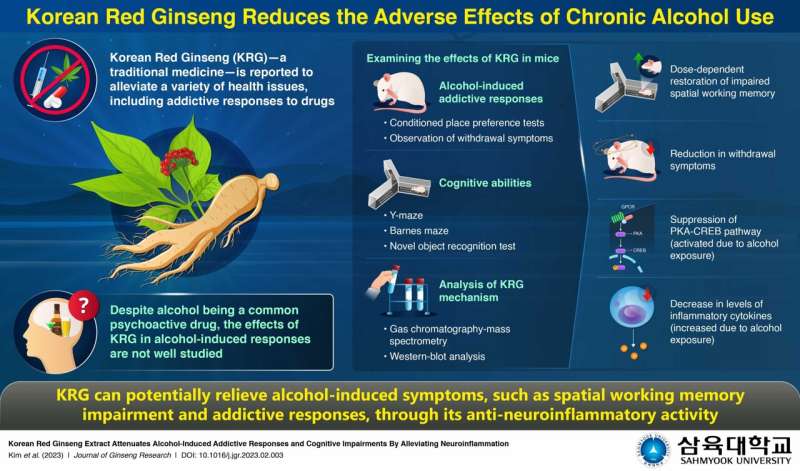This article has been reviewed according to Science X's editorial process and policies. Editors have highlighted the following attributes while ensuring the content's credibility:
fact-checked
proofread
Researchers find Korean Red Ginseng may alleviate addictive effects of alcohol

Alcohol is one of the most commonly used psychoactive drugs, with a growing number of users in many parts of the world. Despite the awareness regarding its adverse effects, individuals can get habituated to alcohol consumption, leading to a medical condition called alcohol use disorder (AUD).
AUD is characterized by the abuse, dependency, and addiction of alcohol, leading to compromised social responses and interactions of the individual. Moreover, it impairs spatial working memory (memory that allows us to orient ourselves to our surroundings) and causes neuroinflammation—an inflammatory response in the brain or spinal cord, thereby effecting cognitive abilities (mental abilities such as thinking and reasoning).
Recent studies have reported the beneficial effects of KRG extract—a traditional herbal medicine—in treating neuroinflammation. Although, it has been traditionally used to treat a number of ailments, KRG is now finding use in diseases of the modern day, such as cardiovascular diseases, cancer, and Alzheimer's disease. Previous research on rodents has demonstrated that KRG can relieve addiction against psychoactive agents. However, not much is known about the its effects on alcohol-induced addictive responses and cognitive impairment.
Adding to the existing body of literature, researchers from Korea sought to find out if KRG extract attenuates addictive responses to alcohol in mice. The study group was led by Assistant Professor Mikyung Kim from the Uimyung Research Institute for Neuroscience at the Sahmyook University, Korea.
Their findings have been published in the Journal of Ginseng Research. The key findings of the study suggest that KRG may alleviate spatial working memory impairments and addictive responses in mice through its anti-neuroinflammatory activity.
"While much is talked about the healing properties of KRG against addictive drugs like cocaine and morphine, there aren't many studies describing its effects on the addictive responses due to chronic alcoholic consumption. Alcohol is a legalized psychoactive drug that is very commonly consumed. Hence, we aimed to examine whether KRG exerts a positive effect on alcohol intoxication responses and cognitive impairments arising from alcohol abuse," explains Assistant Professor Kim, while explaining the team's motivation behind the study.
The group conducted a comprehensive study to assess the impact of KRG on addiction-related responses and cognitive impairments triggered by alcohol consumption. To gauge alcohol's motivational influence, they employed specialized "conditioned place preference tests," followed by examining KRG's effects on alcohol withdrawal symptoms.
Additionally, the researchers utilized the Y-maze, Barnes maze, and novel object recognition tests to analyze spatial working memory impairments after repeated exposure to KRG and alcohol. This in-depth analysis offers critical insights into KRG's potential role in mitigating the adverse effects of alcohol addiction.
Assistant Professor Kim explains the results, stating, "We observed that spatial working memory was restored in KRG-treated mice exposed to alcohol. Moreover, we also noted that mice treated with KRG and alcohol had reduced withdrawal symptoms. The crucial finding here is that a higher dose of KRG led to greater improvement."
The group employed molecular assays on tissue extracts from the mouse hippocampus—the brain region associated with memory and learning, to profile the mechanisms underlying KRG's effects on mental abilities. They discovered that KRG suppressed the PKA-CREB signaling pathway, which is stimulated during substance addiction and as a result of alcohol consumption.
Moreover, the researchers also observed that KRG inhibited the secretion of inflammatory cytokines in the hippocampus. These findings collectively indicate that KRG may alleviate alcohol-induced addictive responses and cognitive impairments by suppressing the PKA-CREB pathway and neuroinflammation.
In the words of Assistant Professor Kim, "The improved spatial working memory of KRG-treated mice shows that KRG can improve the cognitive impairment caused by chronic alcohol use. These results suggest that KRG could be a novel therapeutic intervention for AUD treatment."
Going ahead, the team believes their work will open research avenues in the treatment of alcohol addiction, improving cognitive function, and in the development of herbal medicines.
More information: Hee Jin Kim et al, Korean Red Ginseng extract attenuates alcohol-induced addictive responses and cognitive impairments by alleviating neuroinflammation, Journal of Ginseng Research (2023). DOI: 10.1016/j.jgr.2023.02.003




















